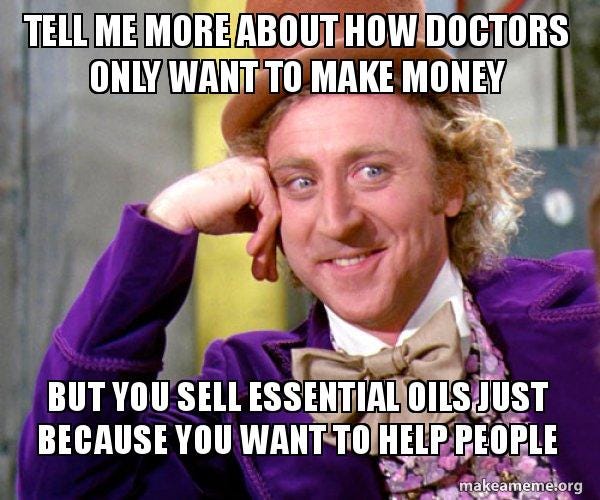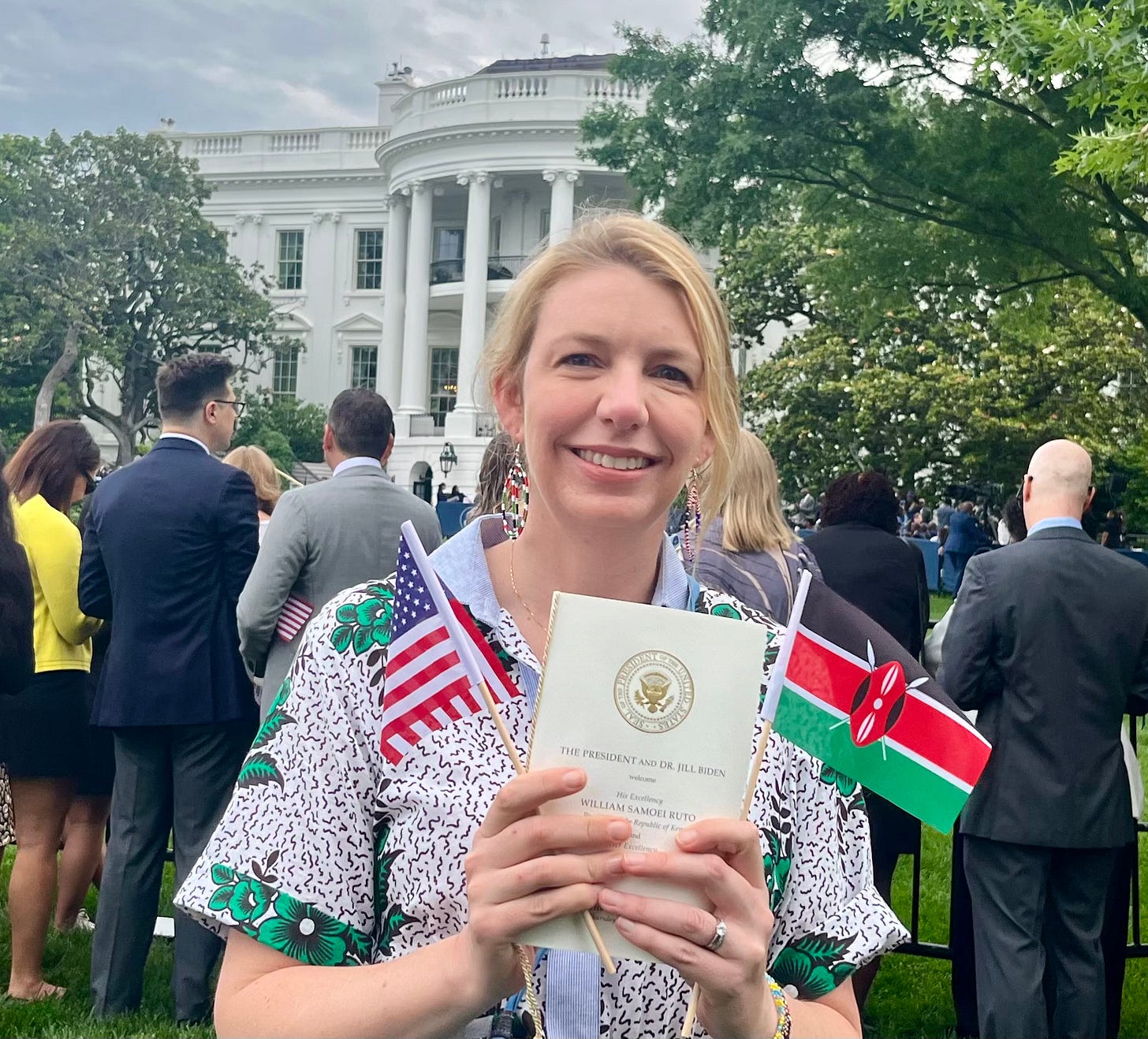While the dumpster fire that was the debate last night raged, I slept peacefully in another hemisphere. I expected to wake up to buoyant democracy lovers enthusing about Joe Biden taking the fight to Dumb Lazy Hitler and ensuring our constitutional democracy would live to see another election. But that’s not what happened.
My other homeland, Kenya, also had a rough week. The current president, William Ruto—who was just in Washington for the first state visit by an African leader since 2008—pushed a bill through Parliament to address Kenya’s massive debt. He was between a rock and a hard place.
But the bill, which would have raised taxes on consumer items at a time of inflation, was greeted by popular outrage. Massive youth-dominated demonstrations turned violent when protesters invaded Parliament and set it on fire (sound familiar?), and police responded with live ammunition. Similar mobs damaged government property around the country. Over twenty people were killed. Ruto withdrew the bill, which only partially satisfied the protesters and put Kenya’s economic future in jeopardy.
Calm is thankfully returning, and I am not at all concerned about my arrival there next week. As usual, westerners remain mostly unaffected as they watch such turmoil from the comfort of their privileged ex-pat bubbles.
With Kenya, I’ve been here before. I’ve watched the long, arduous struggle for democracy since I was a kid. And there has indeed been enormous progress. I grew up under a kleptocratic, at times brutal dictator. Since then, Kenya has had multiple free and fair elections and peaceful transfers of power, including Ruto’s election in 2022. Kenya has also developed a lot economically, too. There’s now a sizable middle class.
But it’s never a straight line. The disputed election of 2007 cost over 1,000 lives. Corruption and poverty remain endemic. Terrorists have attacked. And this week, seeing bodies in the street and watching violent mobs roam the floor of Parliament, I felt as sick to my stomach as I did on January 6.
Ultimately, young Kenyans took the streets and resorted to the mob because they don’t yet fully trust the system. It’s much better than it was for their grandparents, but it’s still not entirely trustworthy. They still see the fat cat politicians in their Mercedes while they struggle to pay for a loaf of bread. They know that that unqualified guy they went to high school with got his government job because his uncle bribed somebody. And too many of them feel they have less to lose from burning it down than they do from taking it on the chin.
I recently read the book Why Nations Fail by two economists. They argue persuasively that more representative, open political systems produce strong institutions that establish and maintain the rule of law, ensuring security and guaranteeing citizens’ ownership of their labor, property, and ideas. This produces innovation and economic development, which further entrenches the rule of law, as more and more people become vested in the system. A virtuous cycle is created over time that spawns ever more political freedom and participation and economic opportunity. They seem to argue that western nations kind of lucked into this cycle through a series of historical accidents. More recently other nations, like Korea, Japan, and Botswana have been able to find their way into virtuous cycles.
Conversely, most of Africa has existed in vicious cycles, in which extractive, exploitative political and economic systems reinforce each other, thwarting the development of institutions, denying citizens security and property rights, discouraging investment and innovation, and in many cases, sparking brutal, zero-sum conflict. When there’s so little to have, you’ve got nothing to lose by resorting to violence. The authors clearly demonstrate why and how slavery and colonialism were so destructive, as they set up vicious cycles that continue to spin out decades or even centuries later. It’s incredibly difficult to break out of vicious cycles. It’s why Somalia and Sudan are completely failed states, and why Kenya’s significant, truly impressive progress is fragile.
You can’t just go to Wal-Mart and buy some high quality institutions like they are a washing machine. Institutions evolve, painstakingly, over time upon the foundations of social trust, consistent performance, and ever deeper and wider commitment to their survival, as more and more people are represented and protected by them. And unlike a washing machine, institutions get stronger and better over time. But only if they are maintained.
We’re at a point now in America where we have apparently decided democratic institutions are like any of the other consumer products with which we gratify ourselves. They’re old and boring. They don’t do everything we want in the way we want. Or figuring out how they work is too taxing. Maintaining them is too costly. So when some con man comes along selling cheap, easy thrills, we’re buying. We just trash the old stuff like we do the last model of iPhone or the granite countertops we just had to have for a hot sec or the skinny jeans that replaced the boot cut jeans that replaced the flares that replaced the mom jeans that replaced the skinny jeans.
Americans have no idea of the millions of things that had to go right and all the stars that had to align to develop the precious gift of a democratic order. Things that we just waltzed into. And other things that we bled and died for. Our own choices almost cheated us out of it repeatedly. Slavery, segregation, violence, bigotry. A devastating Civil War. There’s a reason the South STILL lags on most economic and social indicators. Why the southern states still rank last in education and wealth and first in crime, divorce, and teen pregnancy. It’s hard to correct an exploitative, extractive system. It’s hard to clean up the mess it leaves.
I just watched the new Hitler documentary on Netflix. It’s eerie stuff in these times. It’s pretty clear the German people got what they wanted. Hitler didn’t force himself on them until it was too late. But they did arrive at that place via abject national humiliation and devastating economic loss. Germans were truly desperate, and Hitler offered them what they thought was a lifeline. Easy answers. An essential oil for every ailment.
We aren’t Weimar Germany. As a whole, relatively speaking, we’re doing just fine. Right now, we are massively outstripping the rest of the world. Historically, we are the richest society that has ever existed. Sure, we have our problems, but mere survival isn’t one of them. And do you know how we became so successful and comfortable? Strong institutions. That’s it. That’s the only reason in fact.
Oh, and by the way, to my white evangelicals who feel so embattled they feel they need a pussy-grabbing, coup-making, crime-committing, lying ass bodyguard—you are part of the most dynamic religious scene that has ever existed. You have more religious freedom than any Christians anywhere, anytime. And do you know how you’ve thrived? Strong, SECULAR institutions. That’s it. That’s the only reason in fact.
We are a spoiled, rotten, decadent, lazy society. No one is stealing our democracy from us. We’re dragging it to the curb for the garbage truck to pick up all by ourselves. We guess we’ll try a newer model just for f-ing kicks. If it’s no good, we’ll just go back to the store. No big deal.
As I watch one of my beloved nations claw their way forward, on their hands and knees, hoping and trying and begging to enter a virtuous cycle, my other country loses its head as if on a speeding merry-go-round. The virtuous becomes the vicious. The cycle follows the citizens.
The Founding Fathers wrote so much about virtue. In 18th century terms, virtue meant not only morality, but wisdom, education, and sufficient independence of bad influences and exploitable vulnerabilities. In their minds, only white, male property owners were virtuous enough for self-governance.
They were obviously wrong about who could be virtuous. But they weren’t wrong about virtue. A democracy is only as good as its people.
A friend got me into Ruto’s arrival ceremony at the White House in May. I watched Presidents Ruto and Biden speak about our two nations’ partnership over the years. About our mutual commitment to democratic governance. I heard the band play the Star-Spangled Banner and Ee Mungu Nguvu Yetu. I sang along to both with teary eyes and a full heart.
I couldn’t love each of these countries more. And so they can each break my heart.
I cry over the wind into which Kenya must run.
And I weep over the wind America seems hellbent on inheriting.









You have absolutely and beautifully nailed it. I couldn't agree more! Humanity has a horrible track record of throwing blessings away, but it is still heartbreaking to watch it happen and feeling like the voice of one crying in the wilderness.
Once again, you have managed to stir emotional response with such clear and simple writing.